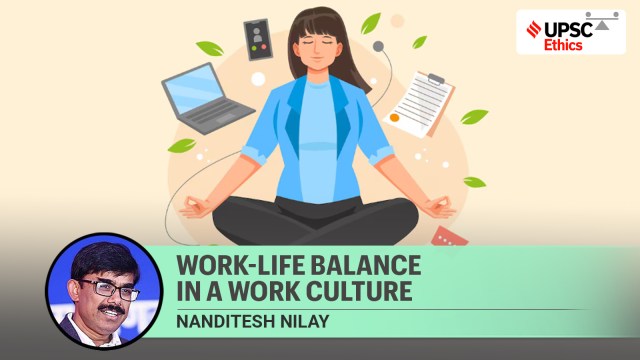UPSC Ethics Simplified: Why is work-life balance vital for a healthy work culture?
UPSC Ethics Paper: Why are work-life balance and leadership’s role in fostering a healthy, productive, and humane work culture essential for work ethics? Ethicist Nanditesh Nilay discusses.
 Work life balance is not about time management. It is about work ethics and positive work culture. (Source: Freepik)
Work life balance is not about time management. It is about work ethics and positive work culture. (Source: Freepik)Work as a duty has ethical foundations. Work is worship, and it has been taught to all of us. Lord Krishna advised Arjuna to work not for personal gain but with a sense of duty. That moral intention can be seen as both Kantian and Utilitarian. But what about the modern day work-life? It is true, and one shouldn’t wait till the end of this article to accept that health, happiness, and a caring attitude towards life can keep the quality of life and productivity positive. Suicide or depression should never be the outcome of any work culture. When the news headlines reported that the Chief Manager of Bank of Baroda died by suicide, what it read in sub-texts was that an important ‘balance’ was missing from his life.
The 70–90 hour debate : Productivity vs. Pressure
A few months ago, when Infosys founder, Narayan Murthy talked about working seventy hours a week to fulfill the dream of a developed India, a debate erupted across the country about working hours. The chairman of Larsen & Toubro, SN Subrahmanyan, even said that if it were up to him, he would like to see his employees in the office even on Sundays—and not just for seventy hours, but for ninety hours a week.
This debate has impacted the work-life balance of every employee who leaves for the office at 8 a.m. and returns home around 8 or 9 p.m.—a twelve-hour workday. And even at home, WhatsApp and phone calls keep him connected to the office.
Dehumanizing work: Humans are not machines
Let’s self reflect through questions. In the age of AI and cut-throat competition, is man being treated as a machine? That God-like customer always demands an emotional and balanced employee — but isn’t that employee also a social being? Does productivity depend only on the number of hours worked, or also on the motivation of the employee? Do organizations not play a role in the happiness or family responsibilities of their employees?
If family relationships are a source of happiness, then why is it not considered necessary for an employee to spend time with their family? Does institutional commitment or productivity depend only on the number of hours worked? Even when we advocate ethics in governance, do we realize that ethics itself requires mental, spiritual, emotional, and physical understanding, grounded in significant values? Under such work pressure, what kind of culture will be practiced?
Work-life balance from the prism of work culture and work ethics
There can be many versions of the definition of work-life balance. Simply put, however, the Cambridge Dictionary defines it as the amount of time you spend doing your job compared to the amount of time you spend with your family and doing things you enjoy. So, the ability to divide one’s time and energy between work and other important aspects of life (family, personal life, recreation) is a step towards healthy work-life balance.
While it might not seem very important at first, work-life balance is essential for a healthy work culture — one built on meaningful work, open communication, and core values, and characterized by an atmosphere of respect, inclusivity, and trust between employees and management. So, healthy work culture expands the definition of work-life balance from just time management.
Traditionally, work ethics is defined as a set of values that guide an individual’s behaviour at work. They are considered the foundation of a productive professional life, incorporating values such as responsibility, integrity, punctuality, hard work, and accountability. However, an important value that lies at the core of work ethics is respect — respect for oneself, one’s time, and one’s life outside of work (including health and recreation). Maintaining a balanced approach to work and personal life is a reflection of this respect.
Quantity vs. Quality: What really matters?
The question is one of quantity vs. quality, of balance — both toward work and toward the life of the person doing that work. Is the quantity of working hours the most important factor, or should we also debate the quality of work? Do we need only a productive workforce, or a happy one as well? Can an imbalance in work-life balance endanger life itself? It is about achieving equilibrium. And in achieving so what needs to be ensured is that work demands are met without negatively affecting personal happiness, relationships, and overall health. It involves setting priorities in a manner that personal life does not become insignificant in front of professional life.
How can we forget the death of Table Space CEO Amith Banerji, who died of cardiac arrest at the age of just forty-five? In Bangalore, there have also been reports of other young founders dying prematurely.
Learning from global experiences
Let’s revisit working hours at the global level after the COVID pandemic. We find that many countries have moved towards a four-day work week, inspired by the work-life balance experienced by employees during that time. Germany, for example, began a six-month trial of a four-day work week on February 1, 2024. They sought to understand how such a work culture makes employees happier, healthier, and more productive. Many labor unions supported the initiative. Countries like the Netherlands, Belgium, Denmark, Australia, and Japan also emphasized the importance of work-life balance. Japan believes that it reduces karoshi, or “death by overwork.”
Steve Jobs and the ethics of self-reflection
An anecdote shared by Steve Jobs in his 2005 Stanford commencement speech is worth mentioning. He quoted something he had read in his adolescence:
If you live each day as if it were your last, you will surely be right someday.
Jobs explained: “For the past thirty-three years, I have looked in the mirror every morning and asked myself, ‘If today were the last day of my life, would I want to do what I am about to do today?’ And whenever the answer has been ‘No’ for too many days in a row, I know I need to change something.”
If one interprets Jobs’ quote, it emphasizes the importance of self-reflection and ethical self-awareness. It makes a strong ethical case for a value-based work culture that isn’t just about performance but also about the human behind that output.
Stress, health, and the imbalance we ignore
A significant aspect of employees fulfilling their duties successfully involves taking care of their mental and physical health. Employees who maintain a good work-life balance are more likely to stay healthy. How does it help? This enables them to stay committed to their roles, have a clear mind, and remain enthusiastic most of the time. Why wouldn’t an employer want that? But in order to cultivate such a work culture, organizations have a moral responsibility to provide an environment that encourages a balance between life and work.
A work environment that respects employees’ need for time off is an important component of work ethic. Imbalance in work-life can lead to stress and can be fatal. Dr. Ranjan Shetty, a cardiologist at Manipal Hospital, writes in his article that imbalance in work-life is a major cause of untimely deaths. If people do not take a break from work, stress will inevitably increase.
Motivation and Management: Theory Y in practice
Pressure at work, combined with less time to rest, may lead to dishonesty, misrepresentation of results, neglect of tasks due to fatigue, or unprecedented losses. However, maintaining a work-life balance encourages honesty and accountability among employees. Here comes the role of motivation which is an important part of employee management.
In Douglas McGregor’s Theory X and Theory Y, Theory Y emphasizes that if employees are properly motivated and the workplace atmosphere is positive, people will do their work happily. A point to remember: the salary and responsibilities of senior management differ significantly from those of middle and junior management. This imbalance also needs to be acknowledged.
Leadership Matters: The bottleneck at the top
Work-life balance enables individuals to focus on their assigned job effectively without burning out. Therefore, employers must remember that for long-term efficiency, sustainability, and productivity, this crucial aspect of work ethics must be respected. As Bajaj Auto’s MD Rahul Bajaj once said, “The leadership of any company needs to understand why, even after spending twelve hours a day, the desired level of productivity is not achieved.” He further warned, “The bottleneck is always at the top of the bottle.”
The ethical case for work-life balance: it goes beyond just time management
In today’s fast moving world, integrating work-life balance into daily practices is essential. Work-life balance must be taken seriously by both leaders and employees. It is in fact part of the basic work ethic. It goes beyond just time management. It involves valuing the humans. Efficiency, productivity, integrity, and honesty are all linked to a positive work culture that demands a work-life balance. If work becomes life (purpose), and life becomes work (family), balance can be achieved. And that balance depends on mindfulness, purpose, and principles that define both work and life.
Post-Read Question:
What is the link between work-life balance and work ethics?
(The writer is the author of ‘Being Good’, ‘Aaiye, Insaan Banaen’, ‘Kyon’ and ‘Ethikos: Stories Searching Happiness’. He teaches courses on and offers training in ethics, values and behaviour. He has been the expert/consultant to UPSC, SAARC countries, Civil services Academy, National Centre for Good Governance, Central Bureau of Investigation (CBI), Competition Commission of India (CCI), etc. He has PhD in two disciplines and has been a Doctoral Fellow in Gandhian Studies from ICSSR. His second PhD is from IIT Delhi on Ethical Decision Making among Indian Bureaucrats. He writes for the UPSC Ethics Simplified (concepts and caselets) fortnightly.)
Subscribe to our UPSC newsletter and stay updated with the news cues from the past week.
Stay updated with the latest UPSC articles by joining our Telegram channel – Indian Express UPSC Hub, and follow us on UPSC section of The Indian Express on Instagram and X.
For your queries and suggestions write at manas.srivastava@indianexpress.com.
UPSC Magazine

Read UPSC Magazine



- 01
- 02
- 03
- 04
- 05




























